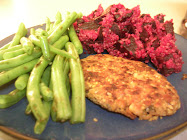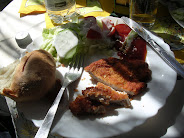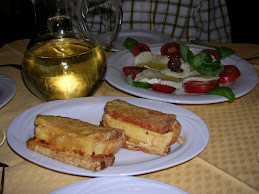After a year and a half in the "real world", I have returned to the journal pages that occupied so much of my time not too long ago. I have been reading books written on the subjects of food and nutrition, but have realized that these are not enough. After coming across "Behavioral Economics, Food Assistance, and Obesity" by David Just (a professor at Cornell), I figured this was a good place to start.
As the title suggests, Just starts by acknowledging the prevalence of obesity among low-income sections of the population and, therefore, the high percentage of obese men and women who rely on food assistance programs. He discusses the difficulties in addressing this situation using standard economic solutions (a fat tax or restrictions on what can or can't be purchased) and advocates that policy makers need to consider the contributions that behavioral economics can make to address such problems. After presenting a variety of examples from behavioral economic and food psychology studies, Just argues that food choices are not always rational and need to be treated as such. Just goes on to discuss a few changes that can be made in the school lunch program, food stamp program, or the WIC program that will encourage participants to spend the assistance money in a way to increase overall health and decrease caloric consumption - thereby addressing the high rates of obesity.
This article provided a very different perspective than a lot of the literature I have been reading about food recently. While Michael Pollan alludes to the variety of contributions food makes to our lives (nutritional, communal, spiritual, ect.), Just views food as something that simply sustains us. As a way to help the school lunch program effectively address childhood obesity he suggests that students eat in very small groups and eat quickly because these conditions encourage eaters to consume fewer calories. Ok, this is definitely logical, but what about that great sense of satisfaction and community that comes from sharing meals with others. Do we have to give that up in order to eat less? Another policy recommendation Just has for improving the efficacy of the food stamp program is to encourage producers to make more individual sized portions and make ready-to-eat meals in smaller portions eligible food items. This, too, encourages people to eat fewer calories, yes, but does not promote a communal enjoyment of food. (The excess packaging is of course an environmental issue as well...)
The prescriptions made by David Just in this article make a lot of sense. They address the issues of overeating in a way that takes an individual's proclivity for being irrational into account. Because of this I believe that his policies have the potential to be effective if implemented correctly. I do, however, find this outlook on food slightly depressing. I love food. I love shopping and cooking and eating and sharing these things with others. I wish others could view food in this manner. The thing is, it's easy for me to say this because I don't have a problem with overeating whereas many people in the US do. This just leads me to wonder, is there a way to fit the enjoyment of the process of eating into an economic analysis of food, food assistance, and obesity? If we could encourage a greater pleasure and connection to what we eat, would that provide people with an incentive to eat better and become healthier?
Just, David R. “Behavioral Economics, Food Assistance, and Obesity.” Agricultural and Resource Economics Review. Vol. 35, No. 2 (October 2006): 1–10.
Subscribe to:
Post Comments (Atom)







No comments:
Post a Comment